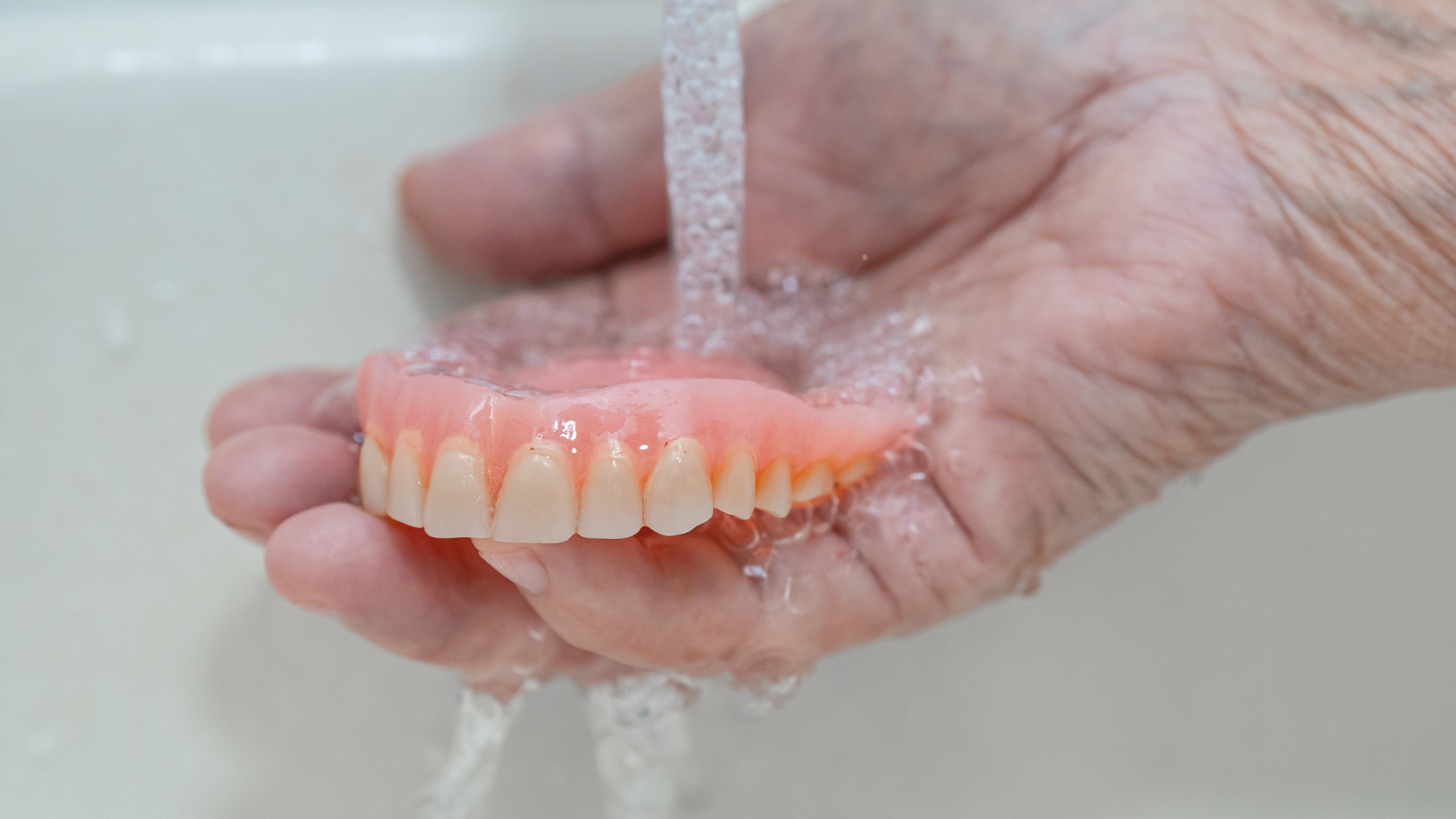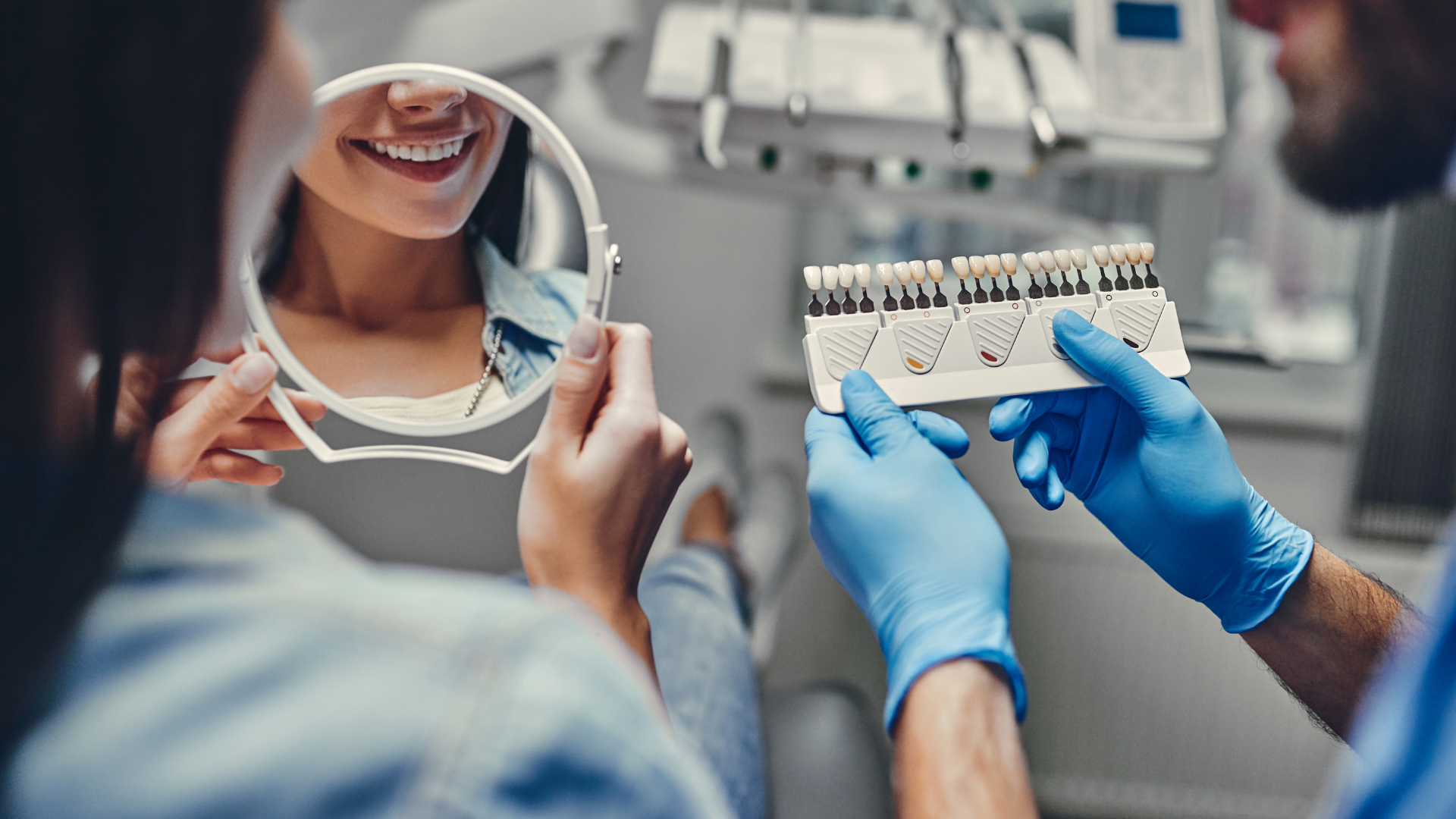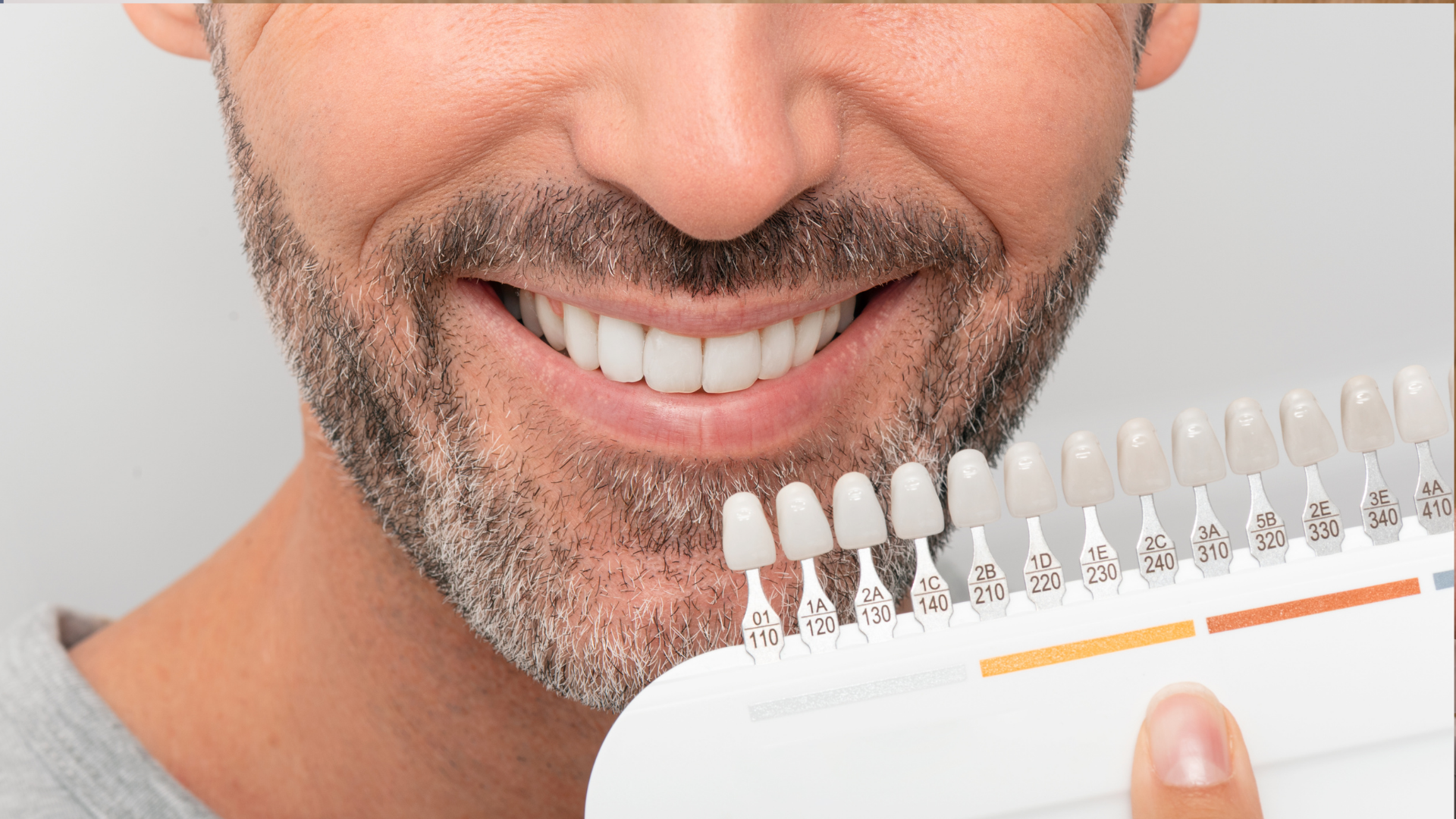Tips for Cleaning Partial Dentures
Daily Cleaning Routine for Partial Dentures
Rinsing After Meals
Maintaining the cleanliness of your partial dentures after each meal is essential for oral hygiene and denture longevity. Rinsing your dentures immediately after eating can help remove food particles and prevent the accumulation of bacteria.
- Remove your dentures carefully from your mouth.
- Hold them under running water, gently dislodging any food particles.
- Ensure the water is not too hot, as extreme temperatures can warp dentures.
By incorporating this simple step into your daily routine, you can significantly reduce the risk of stains and oral infections associated with food debris on your dentures.
Brushing with Unscented Soapy Water
Maintaining the cleanliness of your partial dentures is essential for both hygiene and comfort. Brushing your dentures daily with unscented soapy water is a gentle yet effective way to remove food particles and plaque without causing damage to the denture material.
Follow these steps for optimal cleaning:
- Remove your dentures from your mouth.
- Rinse them under warm running water to wash away loose food particles.
- Apply a small amount of unscented, mild dish soap to a soft-bristle denture brush.
- Gently brush all surfaces of the dentures, paying extra attention to any grooves or crevices where bacteria may accumulate.
- Rinse the dentures thoroughly under warm water to remove all soap residue.
Remember, using scented soaps or strong detergents can leave a taste behind and may cause irritation, so it's important to stick to unscented options.
After brushing, ensure your dentures are completely clean and free from any soap before placing them back in your mouth or soaking them in a cleaning solution. This routine not only contributes to the longevity of your dentures but also to the overall health of your mouth.
Soaking in Denture Cleaning Solutions
Soaking your partial dentures in a cleaning solution is an essential step in maintaining their cleanliness and longevity. Always follow the manufacturer's instructions when using these solutions to ensure that you do not damage your dentures.
- After brushing, place your dentures in a denture cleaning solution to help remove any remaining debris and bacteria.
- Use only recommended solutions, as some products can harm the denture materials.
- Soak them overnight, or for the time specified by the cleaning solution.
Regular soaking not only cleans your dentures but also keeps them moist, which helps maintain their shape and fit.
Remember to thoroughly rinse your dentures after soaking to remove any residual cleaning solution before placing them back in your mouth. This step is crucial to avoid ingesting any harmful chemicals.
Deep Cleaning and Stain Removal
Monthly Vinegar Soak
In addition to the monthly vinegar soak, incorporating denture-specific cleaning tablets into your routine can further enhance the cleanliness of your partial dentures. These tablets are formulated to remove tough stains and bacteria, ensuring your dentures remain hygienic and odor-free.
- Begin by rinsing your dentures under warm water to remove any loose particles.
- Drop one cleaning tablet into a glass of warm water and fully submerge your dentures.
- Allow the dentures to soak for the time specified by the product instructions, usually 15 minutes to overnight.
- After soaking, rinse the dentures thoroughly under running water before placing them back in your mouth.
Regular use of cleaning tablets can prevent plaque buildup and keep your dentures looking and feeling like new. It's a simple step that can make a significant difference in your oral appliance's longevity and your overall oral health.
Using Denture-Specific Cleaning Tablets
Incorporating denture-specific cleaning tablets into your cleaning regimen can significantly enhance the hygiene and longevity of your partial dentures. These tablets are formulated to effectively remove plaque, stains, and bacteria without damaging the denture material.
- Begin by rinsing your dentures to remove any loose particles.
- Fill a container with enough warm water to cover the dentures and drop in the recommended number of cleaning tablets.
- Allow the dentures to soak according to the package instructions, usually around 15 minutes.
- After soaking, rinse the dentures under running water to wash away any remaining cleaning solution.
It's important to use these tablets as directed to avoid over-soaking, which could potentially alter the fit of your dentures.
Regular use of cleaning tablets can help maintain the appearance and function of your partial dentures, ensuring they remain a comfortable and effective solution for your dental needs.
Professional Cleaning Services
While regular home care is essential for maintaining your partial dentures, professional cleaning services offer a deeper level of cleanliness that can't be achieved at home. These services use specialized tools and solutions to meticulously remove plaque, tartar, and stubborn stains, ensuring your dentures remain in optimal condition.
Professional cleanings are recommended at least once a year, or as advised by your dental professional. This routine care can help extend the life of your dentures and maintain your oral health.
When considering professional cleaning, it's important to choose a reputable dental service provider. Here's a checklist to help you select the right service:
- Verify the credentials and experience of the dental practitioner.
- Ensure the clinic follows up-to-date sterilization and cleaning protocols.
- Ask about the types of cleaning agents and equipment used.
- Inquire about the cost and whether it is covered by your dental insurance.
- Check for customer reviews or testimonials to gauge service quality.
Remember, professional cleaning is an investment in the longevity of your partial dentures and the health of your mouth.
Maintaining Oral Health with Partial Dentures
Caring for Natural Teeth
While partial dentures play a crucial role in maintaining the aesthetics and functionality of your smile, it's vital not to neglect the health of your natural teeth. Brushing twice a day with fluoride toothpaste and flossing daily are foundational steps in preventing tooth decay and gum disease.
Regular dental check-ups are essential to monitor the health of your natural teeth and the condition of your partial dentures. These visits allow for early detection of potential issues and adjustments to your dentures if needed.
Maintaining a balanced diet is also important for oral health. Limiting sugary snacks and acidic drinks can help protect your natural teeth from decay and erosion. Here's a simple list to keep in mind:
- Brush with fluoride toothpaste twice a day
- Floss daily to remove plaque and food particles
- Limit intake of sugary and acidic foods and beverages
- Schedule regular dental check-ups for professional cleaning and examination
Ensuring Proper Fit to Avoid Irritation
Ensuring that your partial dentures fit correctly is not only a matter of comfort but also of oral health. A poorly fitted denture can cause irritation, sores, and even infection. Regular check-ups with your dental professional are essential to adjust the fit as needed.
- Visit your dentist regularly for adjustments.
- Be alert to changes in fit due to natural changes in your mouth structure.
- Report any discomfort or sores immediately to your dentist.
It's important to address any fit issues promptly to prevent more serious complications. Remember, your mouth's shape can change over time, which may necessitate adjustments to your partial dentures. Keeping up with these adjustments will help maintain your comfort and oral health.
Nightly Removal to Rest Gums
Ensuring that your partial dentures are properly handled and stored is essential for their longevity and your oral health. Nightly removal of dentures is recommended to allow your gums to rest and recover from the pressure and friction experienced throughout the day. This practice not only helps in maintaining the health of your gums but also contributes to the overall hygiene of your dentures.
When removing your dentures at night, it is important to store them correctly to prevent warping and to keep them moist. Placing them in water or a mild denture-soaking solution can prevent them from drying out and changing shape.
For those seeking professional advice on denture care, the
best dentist in Midland TX can provide personalized recommendations. Regular check-ups ensure that your dentures fit correctly and function as intended, which is crucial for your comfort and oral health.
Handling and Storage Best Practices
Safe Removal and Placement Techniques
Proper handling of partial dentures is essential to ensure their longevity and your comfort. Always use gentle pressure when removing or placing your dentures to avoid bending or breaking them. Here are some steps to follow for safe removal and placement:
- Stand over a folded towel or a sink filled with water to cushion the dentures in case they slip from your hands.
- Use both hands to evenly grasp the dentures when removing them from your mouth.
- Gently rock the denture back and forth to break the seal before lifting it out.
- When placing the dentures back, ensure that they are correctly aligned with your gums before applying gentle pressure.
Remember, never force your dentures into place as this can cause damage to both the dentures and your gums. Instead, if you're having trouble, consult your dentist to check for proper fit.
Storing Dentures in Water When Not in Use
Proper storage of your partial dentures when they are not in use is essential to maintain their shape, fit, and cleanliness. Always submerge your dentures in water to prevent them from drying out and warping. This simple step ensures that your dentures will be comfortable to wear and will fit properly when you put them back in.
It's important to note that while water is suitable for short-term storage, it does not disinfect or clean your dentures. For longer periods, such as overnight, consider using a denture cleaning solution to keep your dentures free from bacteria and odor.
Remember to change the water or cleaning solution daily to maintain a hygienic environment for your dentures. Avoid using hot water as it can cause the dentures to warp. Here's a quick checklist for denture storage:
- Use a clean container with a secure lid to prevent contamination.
- Fill the container with enough water or denture cleaning solution to fully cover the dentures.
- Change the storage solution daily to ensure cleanliness.
- Keep the storage container in a safe place, away from pets and children.
Avoiding Extreme Temperatures and Harsh Chemicals
Proper handling and storage of partial dentures are essential to prolong their lifespan and maintain their structure. Always handle your dentures with care to prevent accidental drops that could cause cracks or breakage.
When storing your dentures, it's crucial to keep them moist to prevent them from drying out and losing their shape. Here's a simple guideline for storage:
- Always place dentures in water when not in use.
- Use a denture soaking solution overnight for additional cleanliness.
- Ensure the water is at room temperature; extreme heat can warp dentures.
Avoid using hot water for soaking or cleaning, as it can cause the dentures to warp. Similarly, exposing dentures to freezing temperatures can make them brittle and prone to damage.
Lastly, refrain from using harsh chemicals, such as bleach or abrasive cleaners, which can damage the denture material. Stick to recommended denture care products to ensure safety and effectiveness.
Frequently Asked Questions
How often should I clean my partial dentures?
Clean your partial dentures multiple times a day with unscented soapy water to maintain oral hygiene.
Can I use regular toothpaste to brush my partial dentures?
No, regular toothpaste can be abrasive. Use unscented soapy water for brushing your partial dentures.
How do I remove stains from my partial dentures?
Soak your dentures in a vinegar solution once a month for 5-10 minutes or use denture-specific cleaning tablets to remove stains and debris.
Should I remove my partial dentures at night?
Yes, remove your dentures every night before bed and place them in water to let your gums rest and keep the dentures hydrated.
How do I store my partial dentures when I'm not wearing them?
When not in use, store your dentures in water or a denture cleaning solution to keep them hydrated and clean.
Is it necessary to visit a dentist for partial denture maintenance?
Yes, regular visits to a professional, such as Impressive Smiles, are recommended for deep cleaning and to ensure your dentures fit properly.




